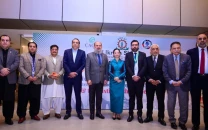A study for all views
Note 13 bases its analysis on a total of 95 privatised units, while Dr Khan’s universe consisted of 79 privatised unit

pervez.tahir@tribune.com.pk
This was damning evidence against the privatisation programme. In the case of public manufacturing enterprises, only a quarter of the units were doing better than before. At this level of performance, the argument that the state must not be in the manufacturing business seems like a joke. Regardless, the ADB recently signed a $20 million Public Sector Enterprise Reform Project to support, among other things, the government’s privatisation programme. This is not surprising as privatisation is an essential component of the neo-liberal agenda pursued by the multilateral financial institutions. The agenda is not necessarily informed or influenced by their research programmes, conducted as these are with a plethora of caveats and disclaimers. What is surprising, however, is that the latest project for assistance makes the case for privatisation by using the same 1998 study.

As a matter of fact, the documentation prepared for the reform project pronounces the privatisation programme of the 1990s as a success story.
In its issue of February 2, 2015, the pro-privatisation Business Recorder has gleefully reproduced note 13 of the Report and Recommendation of the President of the ADB. As reported, the note claims: “An impact assessment of the last Pakistan privatisation programme concluded that it was a success.” The note claimed that 32 per cent of the units privatised performed better than before and 29 per cent performed worse than before. No change in performance was reported for the rest of the units.
This report card is certainly better than the one reported by Dr Khan, though it still does not make a compelling case for privatisation. There is a major discrepancy in the two report cards, however. The note 13 bases its analysis on a total number of 95 privatised units, while Dr Khan’s universe consisted of 79 privatised units. Are the two studies different or different versions of the same study? The truth can only be established if the ADB puts the 1998 study as well as the documentation supporting the the latest assistance in the public domain.
As part of the good governance agenda, multilateral financial institutions go to any length to force the right to information down the throat of a recipient. I wonder if there is anything called the international right to information! The Business Recorder requested the Pakistan office of the ADB to provide the said report, but without any success. Whether the headquarters in Manila would be more forthcoming, remains to be seen.
In the meantime, we stand by the analysis of Dr Khan, who distinguished himself as a civil servant of impeccable integrity and as an economist who would never speak before ensuring that the facts are right.
Published in The Express Tribune, February 6th, 2015.
Like Opinion & Editorial on Facebook, follow @ETOpEd on Twitter to receive all updates on all our daily pieces.



















COMMENTS
Comments are moderated and generally will be posted if they are on-topic and not abusive.
For more information, please see our Comments FAQ